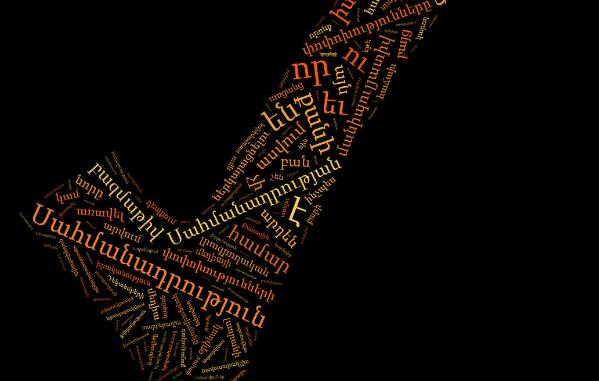
This is a trick that reinforces a desirable result and doesn’t present the reality. If you say “new Constitution,” seemingly you reinforce that it has received this status. But it is still a draft
The December 6 referendum on amendments to the country’s constitution is at the massive campaign stage. The media is exerting efforts to present the draft Constitution beneath a more attractive and balanced light
Numerous articles and reportages are published to say “Yes” or “No” to the draft Constitution and ensure public engagement in the referendum.
The media mentions are monitored from the perspective of providing airtime to both those in favor and those against. Attempts are made also to analyze the content of news stories.
The issue is that by saying “comprehensive coverage,” often attention is not paid to the media delivery of each side. After all, what’s important is not only what is said (“yes” or “no”), but also how and in what context it is said.
For instance, Socioscope, which surveyed [AM] online media, concluded that “the work of online media does not ensure the audience’s full awareness, and many manipulative mechanisms are present,” which don’t allow reality to be presented objectively.
It would be helpful for local Armenians to be acquainted with a few manipulative tricks that are more striking and noteworthy.
It should be remembered that presenting that which is desired as fact and repeating this thought many times leaves the audience with the impression that desire has the power of fact.
For example, it’s one thing when “changes” (or “amendments”) is said, and a completely different thing when the word “reform” is used. The use of the latter already indicates a certain treatment and assessment. The root of “good” [which is in the word “reform” in Armenian] cannot be perceived as neutral and is instinctively associated with the adversary of “bad”. Subconsciously the audience strives for reforms, since good is preferred over bad. Whereas amendments actually can be both positive and negative. And objectivity falls in the middle.
In general, analyzing the language of the media is very interesting, since it’s through linguistic constructions that tricks that pursue a clear purpose but are concealed under a veil of objectivity operate.
Constitutional changes are now at the draft stage and are only a proposal, but many news outlets speaking of the referendum omit the word “draft” and with that guide the audience, creating the illusion that the changes are already a reality.
If the changes are a draft, this should be emphasized, so the audience differentiates it from the Constitution’s actual status.
But often in Armenian media one can come across not “current Constitution” and “draft constitutional amendments,” but the more simplified and manipulative “old Constitution” and “new Constitution” formulations. In this case too (as in the case of good and bad), the emotional element begins to operate, since “new” contrasts with “old” and prompts the new to be chosen, since in this context new is synonymous with positive.
The host of the Public TV of Armenia’s news program goes even further, saying that citizens must decide why to say [AM] “Yes” and why “No” to the Constitution (at 10:04 mins).
Basically, it turns out that if you say “No,” then you don’t want a Constitution.
If the RA Constitution is current, why is it said that it’s old, past, or previous? That it’s already changed its status. It’s obvious that if you ask the authors of articles and reportages, they will say there’s nothing wrong with that. That they didn’t do this intentionally.
While to viewers and readers it might seem that they’re reading a regular news story, but through the choice of words, those in the media want to create the illusion of a clear position for them.
This is a trick that reinforces a desirable result and doesn’t present the reality. If you say “new Constitution,” seemingly you reinforce that it has received this status. But it is still a draft.
This is worth remembering. At least until the referendum to change the Constitution’s status.
Nune Hakhverdyan
The views expressed in the column are those of the author's and do not necessarily reflect the views of Media.am.


Add new comment
Comments by Media.am readers become public after moderation. We urge our readers not to leave anonymous comments. It’s always nice to know with whom one is speaking.
We do not publish comments that contain profanities, non-normative lexicon, personal attacks or threats. We do not publish comments that spread hate.